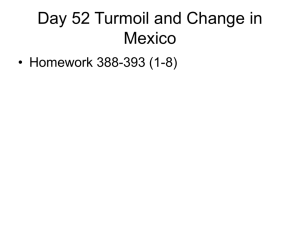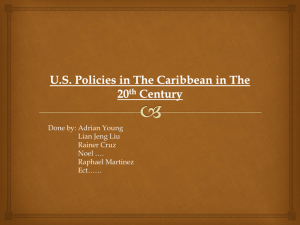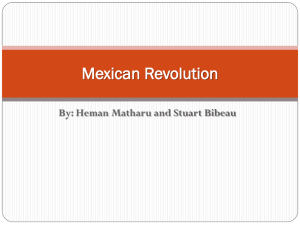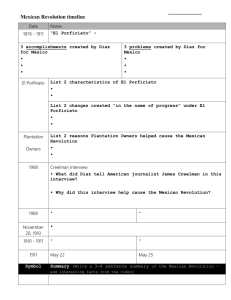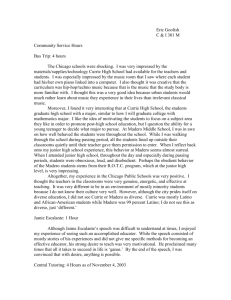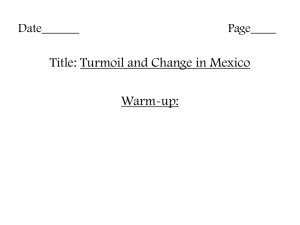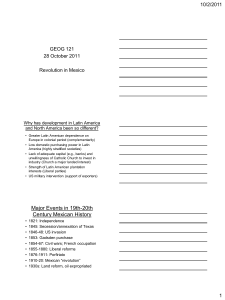Chapter 29-Diaz and the Revolution
advertisement
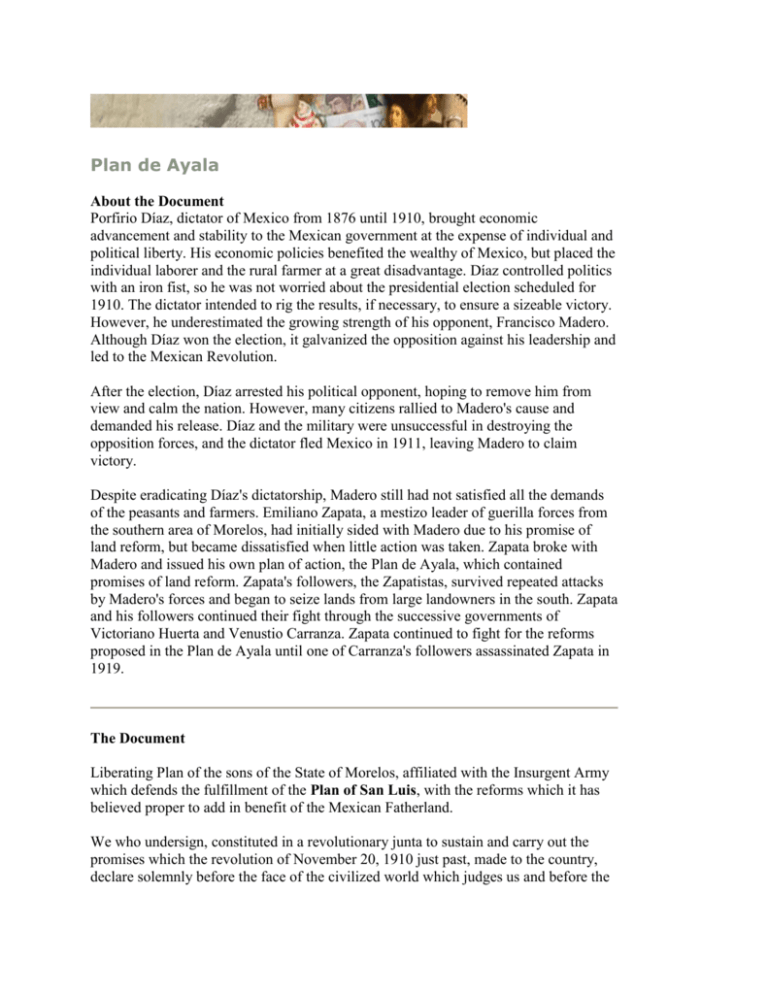
Plan de Ayala About the Document Porfirio Díaz, dictator of Mexico from 1876 until 1910, brought economic advancement and stability to the Mexican government at the expense of individual and political liberty. His economic policies benefited the wealthy of Mexico, but placed the individual laborer and the rural farmer at a great disadvantage. Díaz controlled politics with an iron fist, so he was not worried about the presidential election scheduled for 1910. The dictator intended to rig the results, if necessary, to ensure a sizeable victory. However, he underestimated the growing strength of his opponent, Francisco Madero. Although Díaz won the election, it galvanized the opposition against his leadership and led to the Mexican Revolution. After the election, Díaz arrested his political opponent, hoping to remove him from view and calm the nation. However, many citizens rallied to Madero's cause and demanded his release. Díaz and the military were unsuccessful in destroying the opposition forces, and the dictator fled Mexico in 1911, leaving Madero to claim victory. Despite eradicating Díaz's dictatorship, Madero still had not satisfied all the demands of the peasants and farmers. Emiliano Zapata, a mestizo leader of guerilla forces from the southern area of Morelos, had initially sided with Madero due to his promise of land reform, but became dissatisfied when little action was taken. Zapata broke with Madero and issued his own plan of action, the Plan de Ayala, which contained promises of land reform. Zapata's followers, the Zapatistas, survived repeated attacks by Madero's forces and began to seize lands from large landowners in the south. Zapata and his followers continued their fight through the successive governments of Victoriano Huerta and Venustio Carranza. Zapata continued to fight for the reforms proposed in the Plan de Ayala until one of Carranza's followers assassinated Zapata in 1919. The Document Liberating Plan of the sons of the State of Morelos, affiliated with the Insurgent Army which defends the fulfillment of the Plan of San Luis, with the reforms which it has believed proper to add in benefit of the Mexican Fatherland. We who undersign, constituted in a revolutionary junta to sustain and carry out the promises which the revolution of November 20, 1910 just past, made to the country, declare solemnly before the face of the civilized world which judges us and before the nation to which we belong and which we call [amamos, "love"], propositions which we have formulated to end the tyranny which oppresses us and redeem the fatherland from the dictatorships which are imposed on us, which [propositions] are determined in the following plan: *** 5. The Revolutionary Junta of the State of Morelos will admit no transactions or compromises until it achieves the overthrow of the dictatorial elements of Porfirio Díaz and Francisco I. Madero, for the nation is tired of false men and traitors who make promises like liberators and who on arriving in power forget them and constitute themselves as tyrants. 6. As an additional part of the plan we invoke, we give notice: that [regarding] the fields, timber, and water which the landlords, científicos, or bosses have usurped, the pueblos or citizens who have the titles corresponding to those properties will immediately enter into possession of that real estate of which they have been despoiled by the bad faith of our oppressors, maintaining at any cost with arms in hand the mentioned possession; and the usurpers who consider themselves with a right to them [those properties] will deduce it before the special tribunals which will be established on the triumph of the revolution. 7. In virtue of the fact that the immense majority of Mexican pueblos and citizens are owners of no more than the land they walk on, suffering the horrors of poverty without being able to improve their social condition in any way or to dedicate themselves to Industry or Agriculture, because lands, timber, and water are monopolized in a few hands, for this cause there will be expropriated the third part of those monopolies from the powerful proprietors of them, with prior indemnization, in order that the pueblos and citizens of Mexico may obtain ejidos, colonies, and foundations for pueblos, or fields for sowing or laboring, and the Mexicans' lack of prosperity and well-being may improve in all and for all. 8. [Regarding] The landlords, científicos, or bosses who oppose the present plan directly or indirectly, their goods will be nationalized and the two third parts which [otherwise would] belong to them will go for indemnizations of war, pensions for widows and orphans of the victims who succumb in the struggle for the present plan. 9. In order to execute the procedures regarding the properties aforementioned, the laws of disamortization and nationalization will be applied as they fit, for serving us as norm and example can be those laws put in force by the immortal Juárez on ecclesiastical properties, which punished the despots and conservatives who in every time have tried to impose on us the ignominious yoke of oppression and backwardness. *** 14. If President Madero and other dictatorial elements of the present and former regime want to avoid the immense misfortunes which afflict the fatherland, and [if they] possess true sentiments of love for it, let them make immediate renunciation of the posts they occupy and with that they will with something staunch the grave wounds which they have opened in the bosom of the fatherland, since, if they do not do so, on their heads will fall the blood and the anathema of our brothers. 15. Mexicans: consider that the cunning and bad faith of one man is shedding blood in a scandalous manner, because he is incapable of governing; consider that his system of government is choking the fatherland and trampling with the brute force of bayonets on our institutions; and thus, as we raised up our weapons to elevate him to power, we again raise them up against him for defaulting on his promises to the Mexican people and for having betrayed the revolution initiated by him, we are not personalists, we are partisans of principles and not of men! Mexican People, support this plan with arms in hand and you will make the prosperity and well-being of the fatherland. Ayala, November 25, 1911 Liberty, Justice, and Law Source: From Zapata and the Mexican Revolution by John Womack, Jr., copyright © 1968 by John Womack, Jr. Used by permission of Alfred A. Knopf, a division of Random House, Inc. For on-line information about other Random House, Inc. books and authors, see the Internet web site at /placeholders/external_placeholder.html?http%3A%2F%2Fwww.randomhouse.com. Glossary Plan of San Luis Document issued by Francisco Madero after Porfirio Díaz stole the 1910 election. Madero, virtually in exile, called for Mexican citizens to nullify the election and take up arms against the government. Most scholars argue that the date of the Declaration, November 20, 1910, is the start of the Mexican Revolution. Analysis Questions 1. Could you support this plan if you were a poor farmer? An urban laborer? A wealthy landowner? Why or why not? 2. What is the main goal behind the Plan de Ayala? How will it be achieved? 3. Who does the plan blame for the failure of the revolution thus far? 4. Who is blamed for the economic problems of the common citizens and the farmers? Do you agree?
